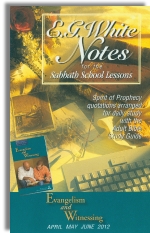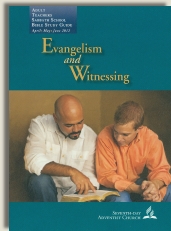|
||||||||||||||
Commentary on "A Perpetual Ministry"
Day 4: Tuesday, June 26, 2012 -Training Trainers
Summary
The author discusses the importance of training individuals (especially the young folks in the church) to go out and share their faith.
The question at the end of the day’s lesson reads, “Think through your experience in our church. Has anyone ever taught you how to witness to others? Have you ever asked to be trained to witness to others? Discuss your answers in class on Sabbath.”
Observations
Again, it’s important to think deeply about the Adventist brand of witnessing and compare it to the way witnessing is done in the non-Adventist realm.
Witnessing According to Adventist Culture and Thinking
Witnessing is the process by which Adventists convert individuals to their 28 fundamental beliefs and prepare them for entrance into their denomination. Because non-Adventist Christians already believe in Jesus and the authority of Scripture, it is arguably more convenient to focus proselyting efforts on them. Adventist doctrine probably feels more foreign to a secular person/non-Christian than it does to a genuine believer in Jesus because Christians understand the history and importance of the Ten Commandments—the doctrine on which all the other Adventnist teachings hinge.
Barriers to Adventist witnessing in the culture
- Adventists must cover a lot more ground with secular persons than with someone who is already a believer in preparing them to accept the stipulations of membership. With a secular individual, Adventists cannot rely on the Bible as a starting point and foundation for discussion.
- The path of least resistance in terms of Adventism's successful witnessing is to proselytize those who are already believers in Jesus. This is where the Adventists focus most or all of their evangelistic training resources. Personally, I have never seen an Advnetist evangelistic series geared toward non-Christians. However, even with Christians there are barriers for Adventists to overcome in convincing them of the Adventist teachings. New Covenant Christians will not want to be put under any part of the Mosaic Law (see 2 Cor. 3). Even if they cannot clearly articulate Biblical reasons for resisting the Sabbath, many times it just doesn’t feel right to them; or they simply do not wish to make Sabbath (as Adventists teach it) a part of their lifestyles.
Witnessing According to non-SDA Christians
For mainstream Christians, the concept of witnessing is very straightforward: to proclaim that by nature we are dead in sin and in need of a Rescuer; and Jesus fulfills that need. Then they ask individuals to believe on Him and follow Him. In this endeavor, there is typically no agenda to persuade individuals to join a particular denomination. There is no urgent need to study and properly interpret prophetic books like Daniel or Revelation. Mainstream Christians generally consider the Gospels and Epistles as sufficient for understanding Jesus’ life and work. Prophetic and historical books are helpful, not for (a) knowing and predicting the future or (b) giving us rules to live by, but as supplementary resources for more fully comprehending Jesus and His finished work. Thus, the end goal is not to present new information to help folks to 'be ready’ for Jesus’ coming. Rather, knowledge of Him is the goal.
“…In Him all the fullness of Deity dwells in bodily form, and in Him you have been made complete, and He is the head over all rule and authority.” Colossians 2:9-10; NASB)
Paul, speaking to one of the early churches, wishes for them “…to reach all the riches of full assurance of understanding and the knowledge of God’s mystery, which is Christ, in whom are hidden all the treasures of wisdom and knowledge.” Colossians 2:2-3; NASB)
Barriers to Christian witnessing in the culture
- In the Western countries, the reigning religious and cultural pluralism makes it difficult to even begin to have a conversation about truth claims (i.e., the existence of external realities that supersede people’s opinions, traditions, social constructions, etc.). Many postmodern/enlightened individuals find the idea of Jesus being the only way of salvation to be stringent, oppressive, and offensive. It is okay to talk about the mercy and love of Jesus; however, it is not okay to regard Him as God and that there are serious consequences for failing to believe His words. "He who believes in Him is not judged; he who does not believe has been judged already, because he has not believed in the name of the only begotten Son of God. (John 3:18; NASB)
- In other parts of the world, Islamic fundamentalism and communism are presenting additional barriers to spreading the Gospel. Every day Christians are being imprisoned, tortured, and executed—not for keeping the Sabbath—but for belief in Christ (http://www.persecution.com/)
In summary, the following table sums up the differences between Adventism and non-Adventism in terms of Adventism's methods of witnessing.
Adventist Witnessing |
Non-Adventist, Christian Witnessing |
Persuading Christians to keep the Sabbath |
Presenting evidence to non-Christians for why they should believe the claims of Jesus. |
Asking Christians to perform the work of keeping the Sabbath for the purpose of being ready for the 2nd coming |
Asking non-Christians to perform the work of believing in Christ. “Therefore they said to Him, “What shall we do, so that we may work the works of God?” Jesus answered and said to them, “This is the work of God, that you believe in Him whom He has sent.” John 6:28-29; NASB) |
Persuading Christians that they are not complete in Jesus until they keep the Sabbath. |
Announcing to non-Christians that we all are by nature under God’s wrath, and the only solution for reconciliation to God is in Christ (Romans 1-5; Colossians 1:20-21). |
Persuading Christians that the Sabbath is (or will be at some point) the litmus test for salvation. |
Persuading non-Christians that being born again is the litmus test for salvation (John 3:5-8). |
Priority is persuading people to find the truth and beauty of the Sabbath. |
Priority is helping people find the truth and beauty of Christ, to whom the Sabbath shadow points (Colossians 2:16-17; Matt. 11:28) |
The purpose of prophesy is primarily for looking forward. Specifically, to teach Christians what will happen in the future; so they will not be deceived by the Mark of the Beast and Sunday worship. |
The purpose of prophesy is primarily for looking back, so both Christians and skeptics have evidence for verifying Jesus’ identity and building trust in His promises. |
Relaying to Christians that they must climb up to God’s standard by exerting their free will to follow His Commandments. |
Relaying to non-Christians that God has already descended to them in Christ. He was born under the law and suffered the punishment that they deserved. He also kept the commandments in their place, and credits them with that accomplishment as if they had done it when they believe in Him. (Romans 4-5; Galatians 3-4; 2 Cor. 5:21; Heb. 10:14) |
Focus is on what we must do. |
Focus is on what Christ has done. |
“Do, do, do.” |
“DONE” (It is finished! John 19:30) |
Copyright 2012 BibleStudiesForAdventists.com. All rights reserved. Revised May 23, 2012. This website is published by Life Assurance Ministries, Camp Verde, Arizona, USA, the publisher of Proclamation! Magazine. Contact email: BibleStudiesForAdventists@gmail.com.
The Sabbath School Bible Study Guide and the corresponding E.G. White Notes are published by Pacific Press Publishing Association, which is owned and operated by the Seventh-day Adventist church. The current quarter's editions are pictured above.
Official Adventist Resources
Standard Edition Study Guide Week 13
Teacher's Edition Study Guide Week 13
Easy Reading Edition Study Guide Wk 13
Search the Complete Published Ellen G. White Writings
Please Support This Project


